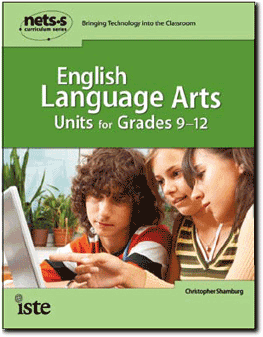Chris Shamburg's Hidden Curriculum Revealed
Christopher Shamburg is an Associate Professor in the graduate program in educational technology at NJCU. He's also a former high school teacher, a Folger Shakespeare Library Educator. Chris has a new book out this month, but before I get to his book, let me give you a good example of what he is getting students and their teachers to do in English language arts classrooms.
As a Folger Educator, he worked with students and faculty at Washington DC's McKinley High School in a project called "Remixing Shakespeare." You can watch the video of the students doing their Macbeth remixes. It shows how they create original short audio dramas using scenes from Shakespeare.
I've seen Chris do this in a workshop for teachers and he's using open source software (like the Audacity audio recorder/editor) and simple no-tech sound effects (coconut shell hoofbeats & the potato chip crunch of footsteps) as well as the students' recordings of the dialogs and license-free audio sound effects.
There are so many lessons going on with this, including the ethical and legal remixing of other creator's work.
That gives you a sense about the lessons Chris offers in his new book, English Language Arts Units for Grades 9-12, that came out this month. The book has twelve language arts units that integrate technology into interesting standards-based lessons. He uses fan fiction and creative writing, blogging ideas, social bookmarking and podcasting to get into assignments like independent reading projects.
Technology-based lessons sometimes scare techphobic teachers, but these are easy enough to do with very little background. Of course, part of the point is that the students are doing them, not the teacher.
You can download his Shakespeare Remix tutorial and get all the needed resources from Folger, and listen to 3 student remix samples. (You don't need to add the rights management info to your audio as Chris does for this lesson, but it's a great idea to be modeling the proper use of licensing to your students. It's also a good chance to have them realize that research paper bibliographies aren't the only place that needs a works cited page).
 Chris calls a lot of this content his "hidden curriculum" - one that values students' interests and experiences, their participation in culture, society, and politics, the effectiveness of real-life experiences, and the importance of connecting learners with the rest of the world.
Chris calls a lot of this content his "hidden curriculum" - one that values students' interests and experiences, their participation in culture, society, and politics, the effectiveness of real-life experiences, and the importance of connecting learners with the rest of the world.
Though the publisher's target audience for the book is probably pre-service English education students and working high school English teachers, I wish the title didn't set that limitation. Many teachers at levels below 9 and above 12 would find the lessons innovative. And if you teach other subject areas and don't feel tech-savvy, it would be a great book to use for getting into those tools & resources.
Chris' previous book, Teachers as Technology Leaders: A Guide to ISTE Technology Facilitation and Technology Leadership Accreditation was written with Cordelia Twomey and Laura Zieger and addressed the National Council for Accreditation of Teacher Education (NCATE) standards for initial and advanced endorsements in the areas of Technology Facilitation and Technology Leadership.
That book was designed to walk faculty and administrators through the process of endorsement. Though it has plenty of practical advice on process planning, document preparation, candidate and program assessment for programs that are training the next generation of education technology leaders, the new book is a lot more fun.
You can tell that Professor Shamburg has also spent some years in front of K-12 students and knows what works and what engages them. The teachers may know the Shakespeare, but their students know YouTube, remixing, computers, and the style that makes it all work. It's meeting them where they are with what they need. It's literacies in the plural, and in his presentation he's remixing all of it in such a way that I think students and teachers may find themselves forgetting in the process that this is schoolwork.
Chris recently asked me for some ideas for his podcasting high school students. They're going to make poetry walk "remixes" - music and poetry to accompany a walker in the city or country. He was looking for recommendations for urban poems (preferably online and in the public domain) for them to use. Want to join in? If you find some resources or want to see some he is using, look at his bookmarks at del.icio.us/cs272/naturewalk.
Chris hasn't abandoned reading, writing or the text. His new book isn't a pop education book that kids will want to read, and it has the standards, handouts, assessment rubrics, and resources (many, thankfully & dynamically, online) that educators expect from ISTE publications. You don't write this type of book to make any bestseller list, get on Oprah or earn enough to quit your teaching job. You do it because you love the work and you love learning new things yourself. Teachers need to be lifelong learners even more than many other professions. Chris Shamburg is a good role model, and I'm glad he's sharing it with the rest of us.
Comments
No comments